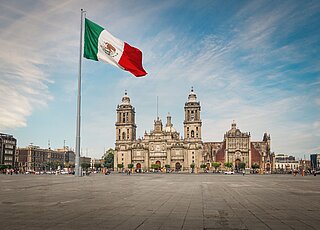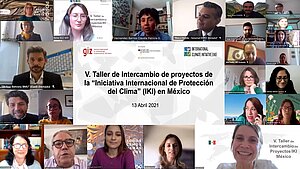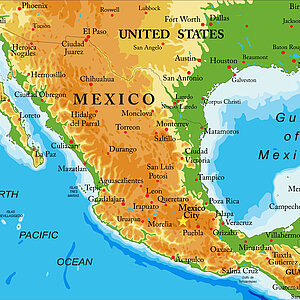IKI Interface Workshop 2021 in Mexico

IKI projects discuss challenges and best practices in the fight against climate change in Mexico together with the BMU.
As in 2020, this year’s International Climate Initiative (IKI) Interface Workshop in Mexico was once again a virtual event because of the ongoing pandemic and so was held online on 13 April 2021. Hosted by the ‘German-Mexican Climate Action Alliance III’ for the fifth year running in its capacity as an interface project, invitations were extended to Mexican partner institutions, the Federal Ministry for the Environment, Nature Conservation and Nuclear Safety (BMU) and IKI projects. A record number of 186 participants discussed a wide range of current topics within climate and biodiversity policy. One key item on this year’s agenda was NDC implementation and how these can be harmonised with the interests of biodiversity conservation.
In its opening presentation, the BMU emphasised the importance of focussing on the implementation of practical measures following the updates to the Mexican NDCs made in December. Dr Philipp Behrens, Head of Division, International Climate Initiative (BMU), and Dr Vera Rodenhoff, Head of Division, International Cooperation on Environment, Energy and Cities, OECD and OECD Countries (BMU), reiterated the BMU’s support for Mexico, as provided by the IKI projects, and the fact that both countries stand to learn from one another in terms of NDC implementation. To support NDC implementation, the Mexican government provides an important instrument in the form of sectoral roadmaps, and these were introduced by Dr Marco Heredia, General Director for Climate Change Policies at the Mexican Ministry of the Environment.
The panel discussion that followed focused on the details of how Mexican partner institutions propose to implement the country’s climate targets and biodiversity objectives. A discussion was also held with participants from many Mexican government departments and the environmental ministries of the states of Jalisco and Yucatán concerning the areas where IKI can provide support in the future. Examples of successful options for integrating mitigation and biodiversity conservation include the agricultural sector. The project ‘Ecosystem-based Adaptation to Climate Change in cooperation with the private sector in Mexico (ADAPTUR)’, which finances ecosystem-based adaptation (EbA) in the tourism sector, was also highlighted as an example of a scalable approach with private sector involvement. At both a national and subnational level, participants identified capacity building, financing, and measurement, reporting and verification (MRV) as challenges that require the provision of greater support on the part of IKI in the future.

The second part of the workshop gave projects the chance to exchange views and experience on best practices and challenges in topic-focused groups. After a brief introduction featuring successful approaches and tools, representatives from over 25 IKI projects discussed climate finance, climate change mitigation at subnational level, and successful approaches to EbA and biodiversity conservation.
The importance and necessity of expert discussion on the subjects of climate and biodiversity implementation was underlined by the large number of attendees and the interests they represent. Mexican-German cooperation in the context of IKI continues to be a key element in the implementation of NDCs and the CBD, and its 41 IKI projects are capable of making an ambitious contribution to climate and biodiversity policy in Mexico.
The link has been copied to the clipboard
Contact
IKI Office
Zukunft – Umwelt – Gesellschaft (ZUG) gGmbH
Stresemannstraße 69-71
10963 Berlin



